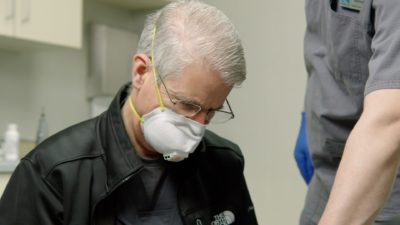What is Achilles Tendonitis?
Achilles tendonitis is pain at the back of the ankle with walking and/or running activities. The pain is usually associated with an increase in frequency or intensity in running or jumping. Achilles tendonitis is a common wear-and-tear injury that affects your Achilles tendon, a tough band of tissue that connects the muscles at the bottom of your calf to your heel bone. Treatment plans can help reduce pain.
Achilles tendonitis affects patients of all ages, but it’s particularly common in those aged 25-50, people who play sports occasionally, and runners who increase the intensity of their workouts. If you find yourself grabbing the backside of your calf and unsure what to do, give Family Foot & Ankle Physicians a call today.
Symptoms of Achilles Tendonitis?
 The most common symptom is a mild ache at the back of your heel following periods of physical activity or even simple walking. You might also experience worse pain following an intense workout that involves long-distance running or stair climbing. It’s also common for people with Achilles tendonitis to experience pain, stiffness, or irritation in the morning when you first get out of bed or after periods of rest. Most of the time, pain caused by Achilles tendonitis subsides after light exercise such as walking or stretching. If it doesn’t subside, you may need one of the Family Foot & Ankle Physicians doctors to diagnose and come up with a treatment plan.
The most common symptom is a mild ache at the back of your heel following periods of physical activity or even simple walking. You might also experience worse pain following an intense workout that involves long-distance running or stair climbing. It’s also common for people with Achilles tendonitis to experience pain, stiffness, or irritation in the morning when you first get out of bed or after periods of rest. Most of the time, pain caused by Achilles tendonitis subsides after light exercise such as walking or stretching. If it doesn’t subside, you may need one of the Family Foot & Ankle Physicians doctors to diagnose and come up with a treatment plan.
Who is at Risk of Developing Achilles Tendonitis?
Anyone can develop Achilles tendonitis, but there are certain factors that may increase your risk, including:
- Being a man. Men typically get this condition more than women.
- Being middle-aged or older, such as 25-50 age.
- Having flatfeet. Let’s get you fit for some custom orthotics to help alleviate the pain you are experiencing.
- Being obese. Unfortunately, the heavier you are, the more pressure is placed on your calves and ankles.
You’re also more likely to develop Achilles tendonitis if you train in cold weather or you wear worn-out shoes that don’t provide adequate support. So make sure you invest in some great shoes and warm up before your workouts.
How is Achilles Tendonitis Diagnosed?
Family Foot & Ankle Physicians diagnose Achilles tendonitis with a review of your medical history, asking about your symptoms, and physically examining your foot and ankle. Your doctor might also gently press on the affected area to determine what’s causing your pain, tenderness, or swelling. If necessary, your doctor might also recommend a series of X-rays or an ultrasound to get a better look at your bones, tendons, and underlying structures in your feet. Our expert podiatrists can help put a plan together to achieve great results and alleviate your pain.
How do you treat Achilles Tendonitis?
 Don’t let Achilles tendonitis negatively impact your quality of life. Whenever possible, Family Foot & Ankle Physicians uses conservative methods of treatment to provide relief from Achilles tendonitis. Depending on your symptoms, you may need physical therapy, custom orthotics, a weight loss plan, or activity modifications and anti-inflammatory measures.
Don’t let Achilles tendonitis negatively impact your quality of life. Whenever possible, Family Foot & Ankle Physicians uses conservative methods of treatment to provide relief from Achilles tendonitis. Depending on your symptoms, you may need physical therapy, custom orthotics, a weight loss plan, or activity modifications and anti-inflammatory measures.
Make an appointment at Family Foot & Ankle Physicians by calling our Greenville office or clicking the online booking button today.
Family Foot & Ankle Physicians has a primary location in Greenville, servicing cities such as Greenville, Farmville, Ahoskie, Kinston, Winterville, Tarboro, New Bern, Edenton, Washington, Rocky Mount, with patients coming from throughout eastern North Carolina and beyond. To request your appointment, call our Greenville office today, talk to your doctor about a referral or use the online booking tool to schedule your visit.
